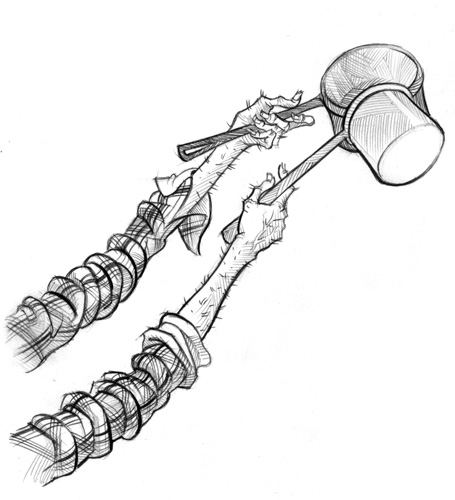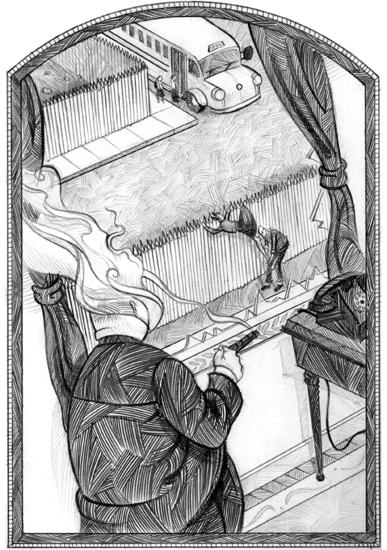Reader Series: 'The Miserable Mill,' Lemony Snicket
This is the fourth post in a series leading up to the premiere of Netflix's 'A Series of Unfortunate Events' on January 13, 2017. The series will cover each of the 13 books and 'Lemony Snicket: The Unauthorized Autobiography.' Be warned: there are spoilers ahead.
The Miserable Mill, compared to the rest of the series, seems a bit out of place. The children are taken to live and work at a logging mill. Aside from the clear child labor and general labor law violations that follow, it's not really clear why Mr. Poe brings the children here, allows them to work here, or is so incredibly oblivious to the obvious child abuse. Supposedly it has to do with a "fair deal," wherein the dubious Sir "protects" the children from Count Olaf as long as the siblings work there.
This is the first book in the series in which Count Olaf pulled in some outside help. Dr. Orwell, an optician who specializes in hypnotism, works with Olaf to sabotage the kids' ability to work in the mill, with the hope that Sir will simply give the kids to 'Shirley,' Olaf in disguise as a simple secretary. While I'm intrigued about other possible evil allies, I find it out of character for any adult in the series to be as inept as they would have to be to just hand over three kids, with no legal procedure or background checks. Then again, when your head is constantly surrounded by cigar smoke, I can't imagine many rational brain cells could survive.
The Miserable Mill is a turning point in the series at it ends the pattern of single guardians actually connected with the Baudelaires' parents, and instead starts the pattern of group caretakers. Sir is technically their guardian here, but hardly ever sees them; the children have significantly more interaction with the unfairly and poorly treated mill workers. As much as Mr. Poe claims he cares or that the authorities will apprehend Count Olaf, we as readers don't see much action on that front. In fact, as 'Shirley' and henchman are escaping from the mill, Sir is simply watching out the window.
The frustration with inept adults is a reality through the entire series, and this book starts off the trend of adults who seemingly just don't care. There will still be inept adults, self-absorbed adults, well-intentioned adults, but there will also be many, many, many adults who - perhaps because they aren't personally affected - don't care much for the troubles in which the Baudelaires find themselves.
The Miserable Mill, compared to the rest of the series, seems a bit out of place. The children are taken to live and work at a logging mill. Aside from the clear child labor and general labor law violations that follow, it's not really clear why Mr. Poe brings the children here, allows them to work here, or is so incredibly oblivious to the obvious child abuse. Supposedly it has to do with a "fair deal," wherein the dubious Sir "protects" the children from Count Olaf as long as the siblings work there.
This is the first book in the series in which Count Olaf pulled in some outside help. Dr. Orwell, an optician who specializes in hypnotism, works with Olaf to sabotage the kids' ability to work in the mill, with the hope that Sir will simply give the kids to 'Shirley,' Olaf in disguise as a simple secretary. While I'm intrigued about other possible evil allies, I find it out of character for any adult in the series to be as inept as they would have to be to just hand over three kids, with no legal procedure or background checks. Then again, when your head is constantly surrounded by cigar smoke, I can't imagine many rational brain cells could survive.
The Miserable Mill is a turning point in the series at it ends the pattern of single guardians actually connected with the Baudelaires' parents, and instead starts the pattern of group caretakers. Sir is technically their guardian here, but hardly ever sees them; the children have significantly more interaction with the unfairly and poorly treated mill workers. As much as Mr. Poe claims he cares or that the authorities will apprehend Count Olaf, we as readers don't see much action on that front. In fact, as 'Shirley' and henchman are escaping from the mill, Sir is simply watching out the window.
I'm sure you have heard it said that appearance does not matter so much, and that it is what's on the inside that counts. This is, of course, utter nonsense, because if it were true then people who were good on this inside would would never have to comb their hair or take a bath, and the whole world would smell even worse than it already does.
"Never mind what my name is,” the man said. “No one can pronounce it anyway. Just call me Sir."
As anyone who's ever been to a doctor knows, doctors are not necessarily your friends, any more than mail deliverers are your friends, or butchers are your friends, or refrigerator repair-people are your friends. A doctor is a man or woman whose job it is to make you feel better, that's all, and if you've ever had a shot you know that the statement 'Doctors can't hurt you' is simply absurd.
"The accident," she said finally, "happened because Klaus was hypnotized."
"What your brother does for a hobby is none of my concern," Sir said.
The frustration with inept adults is a reality through the entire series, and this book starts off the trend of adults who seemingly just don't care. There will still be inept adults, self-absorbed adults, well-intentioned adults, but there will also be many, many, many adults who - perhaps because they aren't personally affected - don't care much for the troubles in which the Baudelaires find themselves.



Comments
Post a Comment